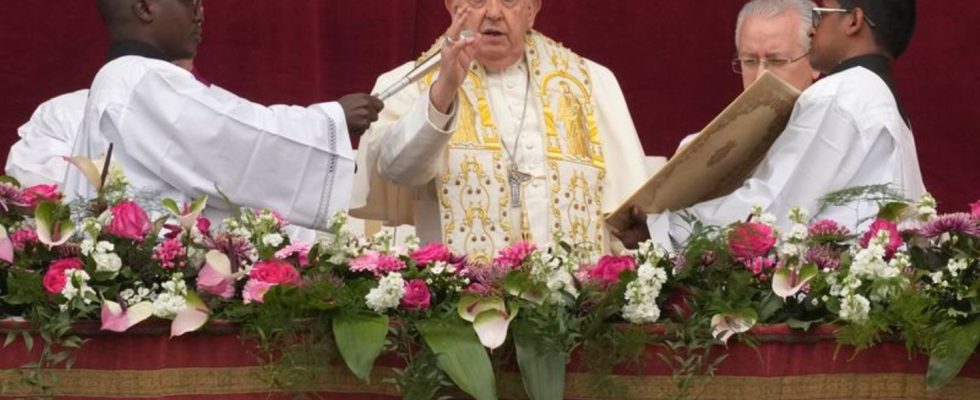Urbi et Orbi
“Why so much death?” – Pope calls for peace at Easter
Pope Francis gives the Urbi et Orbi blessing from the central box of St. Peter’s Basilica. photo
© Andrew Medichini/AP/dpa
War, destruction and human suffering in the Gaza Strip and Ukraine – this characterizes the Easter celebrations in the Vatican. The Pope’s health problems also worried many believers.
An end to the fighting in the Gaza Strip is essential – just for the well-being of the children. “How much suffering we see in their eyes. Their looks ask us: Why? Why so much death? Why so much destruction?” said the pontiff. War is always an absurdity and a defeat.
Pope Francis also called for guaranteed humanitarian access to the Gaza Strip, where many people are starving. The hostages kidnapped by Hamas terrorists and other extremists from Israel in the sealed-off coastal strip on October 7th must also be released.
According to Francis, the world should defend itself against the increasing winds of war across Europe and the Mediterranean. He warned against succumbing to the logic of weapons and rearmament.
The Pope also commented on the Russian war of aggression against Ukraine, which has been going on for more than two years: “I call for respect for the principles of international law and hope for a comprehensive exchange of all prisoners between Russia and Ukraine: all for all!” Two weeks ago, the Pope’s interview statements about raising the “white flag” in the Ukraine war sparked massive opposition around the world. There he said: “When you see that you are defeated, that things are not going well, you have to have the courage to negotiate.”
Pope reminds us of the conflicts in this world
In the Easter message, the Pope usually focuses on conflicts and wars and calls for peace and reconciliation. This year he also recalled conflicts in Syria, Lebanon and between Armenia and Azerbaijan. He also mentioned Haiti and Myanmar as well as the African continent. Francis’ appeals for peace were interrupted by applause from the faithful.
He celebrated Easter mass with tens of thousands of pilgrims and tourists. He was then driven past the crowds in the Popemobile to great cheers – many believers shouted loudly “Viva il Papa!” (Long live the Pope). With temperatures around 20 degrees and strong winds, St. Peter’s Square was well filled. As every year, the square was decorated with numerous flowers and plants.
Health problems
The highlight was the “Urbi et Orbi” blessing, i.e. the city and the world. Francis gave the blessing while standing. Beforehand, he read his Easter message while sitting. The 87-year-old has been in poor health for some time. His voice was still a bit hoarse and he seemed short of breath. In contrast to previous public appearances, no Vatican employee had to read out his speech.
On Good Friday, concern for Francis was once again great: at short notice and surprisingly, he decided not to take part in the Stations of the Cross devotion at the Colosseum in Rome. Just a few minutes before the “Via Crucis” began at the Colosseum, the Holy See announced that Francis would follow the procession from his residence in the Vatican to protect his health. Among other things, Francis has been suffering from the consequences of a persistent respiratory infection for months. He clearly finds it difficult to speak for long periods of time.
He had already canceled the “Via Crucis” at the ancient amphitheater last year. Nevertheless, the cancellation only a few minutes before the start of the procession caused a stir, because on Maundy Thursday he had still seemed relatively relaxed and fresh. He washed and kissed the feet of twelve inmates in a Roman prison – a gesture meant to symbolize humility. At Easter Vigil on Holy Saturday he again completed a service lasting several hours and read a ten-minute sermon.
High security precautions
Security measures are usually high in Rome at Easter. They were particularly strict this year after the Islamist terrorist attack near Moscow.
Christians also celebrated Easter in Jerusalem – in the shadow of Hamas’ terrorist attack on Israel around six months ago and the subsequent Gaza war. Patriarch Pierbattista Pizzaballa, the highest Catholic dignitary in the region, celebrated Easter mass in the Church of the Holy Sepulchre that morning. Referring to the Gaza war, he said: “This enormous crisis has shaped all of our lives, without distinction.”

